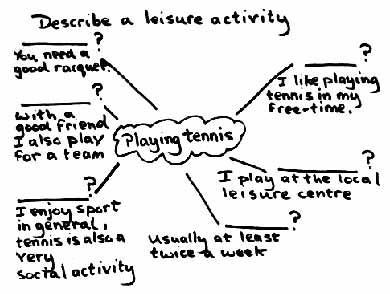Introduction
This section aims to prepare students to talk for between one and two minutes on a given topic as well as on what kind of questions to expect in part two of the speaking test. Below is a list of the kind of topics to expect in part two of the test.
List of topics
Describe….
1. a leisure activity you enjoy
2. an important festival in your country
3. a book you have read
4. a film you have seen
5. a TV programme that you enjoy watching
6. music you enjoy listening to
7. someone you admire
8. a child you know
9. a present you gave to someone
10. a present someone gave to you
11. a personal possession that is important to you
12. a job you would like to have
13. something you would like to own
14. a skill you have learnt
15. a teacher who has influenced you
16. a house you would like to live in
17. a place you would like to visit
18. a tourist attraction you would like to visit
19. a tourist attraction you have visited
20. a country you would like to live in
21. a place you know well
22. a place you have visited
23. an important event that took place in your life
24. what kind of clothes you like wearing
25. a picture or photograph you have or know
26. a public event you went to
27. a prize you won
28. a competition you took part in
29. a journey you went on
30. your best friend
Practising making one-minute notes
From experience, this is something that students don’t really take advantage of and therefore don’t give themselves the chance to prepare adequately for. One problem is that in the minute provided students either: a) don’t write any notes at all, b) don’t know what to make notes about, or c) are unable to write short key notes (they often try to write whole sentences!). The fact is they only have one minute – not a lot of time. Therefore training in making short key notes using one or two words only for each point they want to make is essential. Practise the following activity with different topics from the list above:
Mind mapping (illustrate with an example as follows on board)

From the answers given above elicit the missing questions, i.e.:
What do you like doing in your free time?
Where do you play tennis?
How often/when do you play tennis?
Why do you enjoy playing tennis?
Who do you play tennis with?
What equipment do you need?
Isolate the beginning word of each question:
WHAT?
WHERE?
HOW?
WHEN?
WHY?
WHO?
Ask students to remember the words above. Give out a new topic from the above list. Students ask questions on the given topic in the same way (mentally only). Students make notes of their answers to the above questions with one or two-word answers. Therefore, in the minute in which they have to make notes they will:
- ask themselves mentally six questions
- record short answers as notes
When speaking they will structure their talk on the short answers. For example, using the mind map illustration in the one minute available to make notes the student could have written:
tennis
leisure centre
twice
enjoy sport/social
friend/team
racquet
Bear in mind that the given topic will already have two or three small sub-questions on the card. However, this method is really effective at getting students to focus in the little time they have to prepare and also allows them to structure their talk. This in turn usually leads to a clearer, coherent, confident talk.Try this method over and over again on a variety of topics over the whole course, for example:
| Describe your favourite food …. | |
|---|---|
| what | pizza |
| where | home / restaurant |
| when | once a month |
| why | italian food, different kinds of food, international |
| who | family, girlfriend |
Games to help prepare for speaking part 2
Don’t say the word (same idea as in ’Taboo’ board game): This activity gives the students further practice in describing something for an extended period of time. For example, you give the student a card as follows:
| telephone | talk speak chat mobile |
|---|
In pairs or small groups one student has to describe the first word but without using any of the other words next to it. The other student(s) have to guess the word being described.
Talk for a minute: Based on a radio show game on the BBC World Service in which contestants have to try and talk for a minute about a given topic without hesitating for more than two seconds and without repeating words already used. This could be played in class using the part two topics from the earlier list.
IELTS: Speaking

Activities and ideas to help students with the speaking component of the IELTS exam.
- 1
- 2
- Currently reading
IELTS: Speaking test: Preparation for part 2
- 4





No comments yet